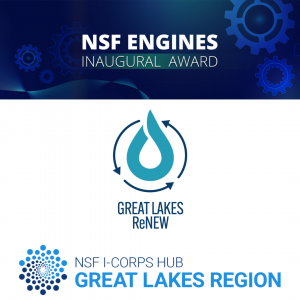
January 30, 2024 – Great Lakes ReNEW has been awarded up to $160 million over 10 years from the U.S. National Science Foundation to develop and grow a water-focused innovation engine in the Great Lakes region, the NSF announced today. The six-state collaboration is coordinated by Chicago-based innovation hub Current and is comprised of over 50 regional partners including the NSF I-Corps Hub: Great Lakes Region. Great Lakes ReNEW is among the 10 inaugural NSF Regional Innovation Engines (NSF Engines).
In its winning proposal, ReNEW sets out to turn waste into wealth by figuring out how to remove dangerous forever chemicals, such as PFAS, and valuable minerals, such as lithium, from our wastewater. The vision is that American manufacturers would then reuse some of these extracted valuable minerals, enabling domestic production of batteries and fertilizers, almost all of which are currently imported.
The Great Lakes I-Corps Hub is playing a leading role in ReNew’s mission of fostering innovation by supporting entrepreneurship and innovation training for teams and companies with cutting-edge water purification technologies. The Hub will help to develop Engine specific curriculum to accelerate water-specific innovations to market. I-Corps’ novel curriculum teaches innovators how to think like entrepreneurs. Utilizing the Lean LaunchPad methodology, the business model canvas, and customer discovery interviews, teams and companies can determine if their innovative idea or research will be successful in the commercial market. Entrepreneurship training will enable the enduring success and growth of the innovations fostered through ReNew.
“Not only will the Great Lakes Region benefit from the new Engine and the Great Lakes I-Corps Hub working together to accelerate research from lab to market, but the entire world will benefit from this collaboration,” said Jed Taylor an assistant dean for Grainger Engineering at the University of Illinois and co-director at the Great Lakes I-Corps Hub.
“Waste has no place in this world of increasing water and resource scarcity,” said Alaina Harkness, executive director of Current and principal investigator for Great Lakes ReNEW. “Our engine will find new ways to recover and reuse water, energy, nutrients, and critical materials from our water. These innovations will create economic opportunities for residents of our region; help strengthen our domestic supply chain for clean energy technologies; and address water quality and security issues around the world.”
With a potential NSF investment of nearly $1.6 billion over the next decade, the NSF Engines represent one of the single largest investments in place-based research and economic development in the nation’s history—uniquely placing science and technology leadership as the central driver for regional economic competitiveness and job creation.
“The inaugural NSF Engines awards demonstrate our enduring commitment to create opportunity everywhere and enable innovation anywhere,” said NSF Director Sethuraman Panchanathan. “Through these NSF Engines, NSF aims to expand the frontiers of technology and innovation and spur economic growth across the nation through unprecedented investments in people and partnerships. NSF Engines hold significant promise to elevate and transform entire geographic regions into world-leading hubs of innovation.”
The grant award number is 2315268. Additional information can be found on the National Science Foundation’s website and the Great Lakes ReNEW website.
About the NSF I-Corps Hub: Great Lakes Region
The NSF I-Corps Hub: Great Lakes Region aims to spur innovation, collaboration, and economic impact in the region. Supported by a grant from the National Science Foundation, this regional alliance is a network of educational institutions and other partners that educate, support, and connect academic researchers to the entrepreneurial ecosystem across the region.
